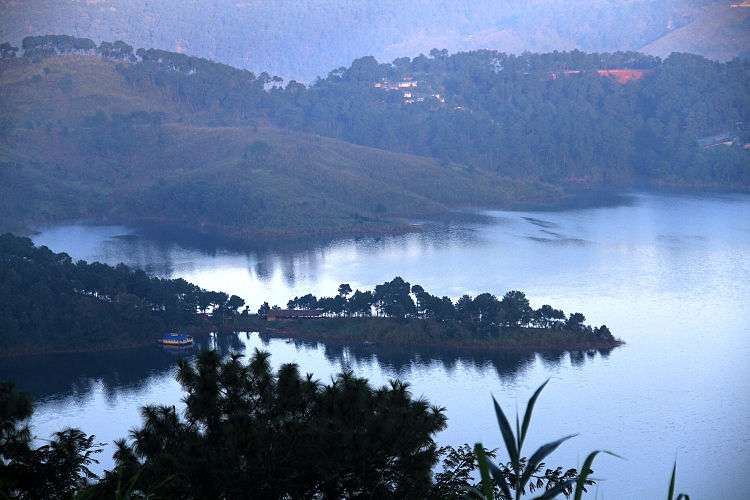Umiam Lake
| Umiam Lake | |
|---|---|
 | |
| Location | Meghalaya |
| Coordinates | 25°39′12″N 91°53′03″E / 25.6532°N 91.8843°ECoordinates: 25°39′12″N 91°53′03″E / 25.6532°N 91.8843°E |
| Type | Reservoir |
| Catchment area | 220 km2 (85 sq mi) |
| Basin countries | India |
| Settlements | Shillong |
Umiam Lake (commonly known as Barapani Lake) is a reservoir in the hills 15 km (9.3 mi) north of Shillong in the state of Meghalaya, India. It was created by damming the Umiam River in the early 1960s. The principal catchment area of the lake and dam is spread over 220 square km.
History
Umiam Dam, which impounds the lake, was built by the Assam State Electricity Board in the early 1960s. The dam's original purpose was to store water for hydroelectric power generation. The Umiam Stage I powerhouse, north of the lake, has four 9-MW turbine-generators, which entered commercial operation in 1965. Umiam Stage I was the first reservoir-storage hydroelectric project commissioned in the northeastern region of India. (Umtru Hydroelectric Project, a run-of-river project with an original capacity of 8.4 MW, began operation in 1957.) Three more stages of the Umiam Project were subsequently built downstream.[1]
Tourist destination
The lake serves as a major tourist attraction for the state of Meghalaya. It is also a popular destination for water sport and adventure facilities. Tourists visit this spot for kayaking, water cycling, scooting, and boating.
Ecological effect
Apart from storing water for electricity generation, the lake also provides numerous ecosystem services at micro, meso and macro levels. Downstream irrigation, fisheries, and drinking water cater to local anthropogenic needs.
Toxic threat and silting
Due to the rising population of Shillong upstream of the lake, the lake is starting to become highly polluted. Also, there is the heavy problem of silting. An estimated 40,000 cubic metres (1,400,000 cu ft) of silt enters Umiam Lake every year. Causes range between upstream encroachments, deforestation, blockage of natural drainage systems, and unscientific mining et al. in the catchment area. Excessive silt load in the lake has lowered the storage.
Gallery
- View of Umiam Lake
- View of Umiam Lake
- View of Umiam Lake
 Sunset at Umiam Lake
Sunset at Umiam Lake View of Umiam Lake
View of Umiam Lake Magnificent Umiam lake
Magnificent Umiam lake Lakeside boats, Umiam Lake
Lakeside boats, Umiam Lake Umiam lake view
Umiam lake view
References
External links
| Wikimedia Commons has media related to Umiam Lake. |
- Umiam lake faces toxic threat
- Umiam Dam satellite map
- Umiam Lake Details
- Siltation and Pollution Contribute to Power Crisis in Shillong
- Pollution of Umiam Lake